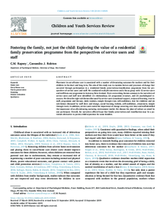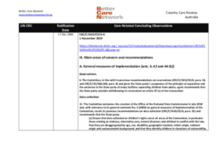Displaying 211 - 220 of 947
This essay provides an overview of an alternative to the traditional model of social work that was developed in the context of an initiative seeking to address the community-level factors shown to influence children’s safety. The model described in this essay was part of an effort to replicate Strong Communities for Children (Strong Communities)—which was first piloted in the USA to keep children safe by building systems of support for parents with young children —in south Tel Aviv, Israel.
Reflecting upon research on child neglect, this article focuses on the importance (or lack thereof) given to the views of families in neglect situation within this field.
The present exploratory study aimed to describe and profile the characteristics of children placed in kinship care and their mothers, as reported before placement.
The aim of this study was to examine factors and processes of change that occurred through participation in a residential family preservation/reunification programme from the perspectives of service users and staff.
This article draws from the authors’ experiences of implementing ecologically-based treatment models based on multisystemic therapy, including the Neighborhood Solutions Project (NS) and Multisystemic Therapy for Child Abuse and Neglect (MST-CAN). The authors call for a rigorous multisystemic approach to the protection of children, one that pays attention to children at risk of harm and those who are involved in formal child protection systems because they have experienced maltreatment.
This country care review includes the care related Concluding Observations adopted by the Committee on the Rights of Persons with Disabilities and the Committee on the Rights of the Child.
This chapter focusses on the experiences of expectant parents in Scotland of navigating the child protection involvement with their as yet unborn infant.
This study explored the construct of mothering children during family‐centered substance use treatment using a transcendental phenomenological approach.
The authors of this study systematically compared parenting interventions offered in 12 maternal substance use treatment programs in one Canadian province with those described in the research literature.
In this article, the authors analyse how interventions of the State may undermine, rather than activate, the caring capabilities of vulnerable families across the life course, drawing on examples from Australia, England and the USA.


